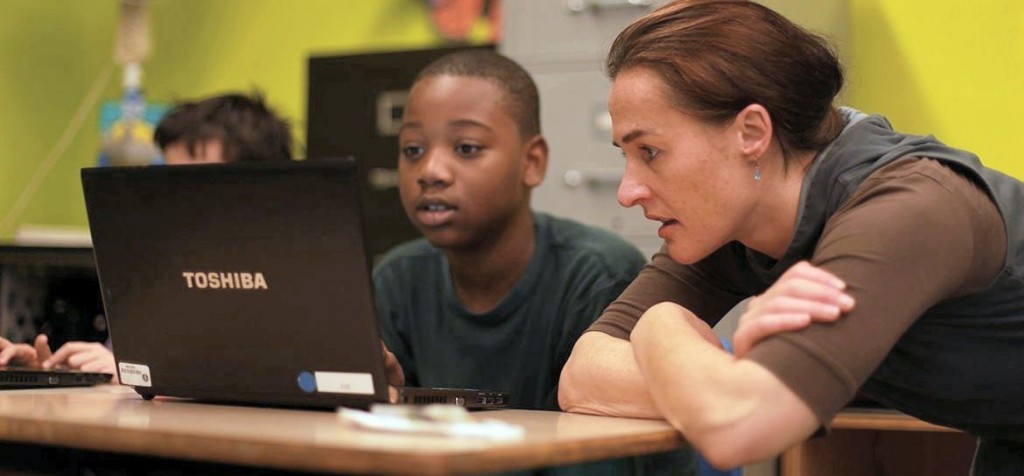
Kate Arthur’s program includes a 3-stage Education Development Plan that follows children from 7 years old to 13 +
One of the largest commercial game developers has announced a multi-million-dollar investment in game development education, including a program that will fund more coding instruction for kids in underprivileged Canadian neighborhoods.
Ubisoft Montréal recently announced its CODEX program will deliver $8 million and more than 1,000 hours of volunteer instruction over 5 years to benefit 17 different educational partners, including the non-profit Kids Code Jeunesse.
The Montréal-based coding program facilitates kids workshops, trains willing educators, and uses free open source programs like Scratch, the visual programming environment developed at MIT that lets kids code stories, artwork and games by snapping together digital blocks with coding language inside. Prominent entertainment companies like Mattel and the Cartoon Network have also used Scratch to create their own brand of coding tutorials.
Kids Code Jeunesse Director and Co-founder Kate Arthur said initiatives like CODEX are important for her relatively small program because government support for coding in Canada has been less than enthusiastic.
“Your president has talked a lot about coding whereas our prime minister didn’t really respond,” said Arthur.
We don’t get funded by the government, and it has taken us a while to get anyone’s attention. We submitted for a grant for teacher training, but public schools in Canada don’t have the money to teach these types of programs. It’s not a priority in the Canadian government.
— Kids Code Jeunesse Director and Co-founder Kate Arthur
Arthur says they’re training some of Ubisoft Montréal’s staff how to run a workshop for kids and, in turn, the developer will sponsor several game workshops outside of schools, including a major event in January that will pay for an instructor in a yet-to-be determined Montréal school.
Kids Code Jeunesse had barely opened its doors in 2013 when Arthur approached the game development giant about starting a relationship. She knew she was offering something valuable.
“Ninety percent of developers don’t have the tools or, more importantly, the confidence to teach a room full of 6-year-old kids how to code. Ubisoft benefits from kids learning to code. The math involved is huge — trigonometry, geometry — it’s quite in depth. But there’s a lot of demand from parents with kids who want to build games. If we can show kids how [games] are built, we can get kids who are obsessed with games to make them rather than consume them all the time.”
Canadian public education’s apparent hesitancy to embrace coding sits in sharp contrast to its commercial game industry. Five hundred game studios call Canada home. They’re currently enjoying a $3 billion boom, and are expected to add nearly 1500 jobs in the next 2 years.
Google launched a coding initiative similar to CODEX in Canada last year, but some tech experts still say Canada has been too slow adopting more modern approaches to computer science education, severely lagging behind other Western countries like the U.S., Finland and Australia.
Ubisoft Montréal and its 2,600 game developers have played a significant role in their industry’s financial success, and seem motivated to establish an educational culture from which they can not only recruit young, skilled talent, but establish “video game production as a pedagogical tool.”
“Our mission through the CODEX program is to share our technological expertise and our knowledge of creative processes to prepare future generations for the challenges that await them. We are putting all our knowledge of video game production at our partners’ disposal so they can be equipped to motivate, inspire and teach the youth that form our next generation,” Ubisoft Montréal CEO Yannis Mallat said in a statement.
In its two-year history, Arthur estimates Kids Code Jeunesse — which runs with an alternating pool of 400 volunteers, but only 3 full-time staff — has enrolled 5,000 kids into their workshops and in-school coding sessions despite skepticism from some parents and busy educators hesitant to shake up their lesson plans.
“We’re not replacing anything,” Arthur said. “But if they’re working on an English assignment, why not do that in a webpage instead of a piece of paper? If their doing an Earth Day project, why not build an interactive project in Scratch and demonstrate it? Why be static? Teaching programming to kids is easy, it’s teaching them how to be safe and responsible online…that’s the hard part.”
